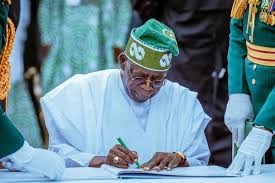President Bola Ahmed Tinubu has made bold moves in Nigeria’s education sector by appointing new governing council members for three major federal universities. This comes two months after his administration dissolved the previous council of the University of Abuja and dismissed its vice-chancellor, Professor Aisha Sani Maikudi. The changes reflect what the presidency calls a renewed drive to reposition higher education in the country.
The appointments were announced in a statement by the Special Adviser to the President on Information and Strategy, Bayo Onanuga. The affected institutions are the University of Abuja (which has reportedly been renamed Yakubu Gowon University), the University of Nigeria, Nsukka (UNN), and Nnamdi Azikiwe University, Awka (NAU).
At the centre of these changes is the University of Abuja. Earlier this year in February, Tinubu dissolved the governing council of the university and relieved Vice-Chancellor Professor Maikudi of her duties. Her removal followed controversies surrounding her eligibility and appointment process.
Now, the newly appointed governing council members for the university include Professor Rosemary Egonmwan (South South), Dr. Adedeji Adefuye (South West), Professor Sarki Abdulkadir (North West), and Professor Aminu Dukku (North East). These names, drawn from different geopolitical zones, are expected to bring new energy and direction to the university.
Senator Lanre Tejuoso has also been named the new Pro-Chancellor of the institution. He was previously the Pro-Chancellor at the University of Agriculture, Makurdi. Taking over his role in Makurdi is Senator Joy Emordi, who now becomes the Pro-Chancellor of Alvan Ikoku University of Education. In the interim, Professor Lar Patricia Manko will serve as Acting Vice-Chancellor for six months. However, it has been clearly stated that she will not be allowed to contest for the substantive VC position when it becomes open.
At the University of Nigeria, Nsukka (UNN), leadership restructuring has also taken place. President Tinubu removed Professor Polycarp Emeka Chigbu from his role as Acting Vice-Chancellor before the end of his term. In his place, Professor Oguejiofu T. Ujam has been appointed Acting Vice-Chancellor for a similar six-month tenure with the same restriction on contesting for a permanent role.
The President also named Engineer Olubunmi Kayode Ojo as the new Pro-Chancellor of UNN. Engineer Ojo has served as Pro-Chancellor at two other federal universities: the Federal University of Lokoja and the Federal University of Oye-Ekiti. General Ike Nwachukwu, who held the Pro-Chancellorship at UNN, has now been posted to the University of Uyo in the same capacity.
In Nnamdi Azikiwe University, Awka, Barrister Olugbenga Kukoyi has been announced as the new Pro-Chancellor. Kukoyi was previously a council member at UNN and is expected to bring governance expertise to NAU. In addition, the newly constituted council for NAU includes Dr. Nkem Okeke (South East), Ofoke Ugbala (South East), Dame Yakowa (North West), and Nojeeb Agunbiade (South West).
These changes, according to State House sources, are part of the Tinubu administration’s strategy to clean up and revitalize federal universities across the country. With issues like chronic underfunding, frequent industrial actions, poor infrastructure, and questions around leadership integrity haunting Nigeria’s tertiary institutions, the government believes that fresh leadership could pave the way for meaningful reforms.
Observers in the education sector have noted that the latest appointments reflect a balanced approach in terms of regional representation and professional backgrounds. The presidency has also made it clear that the temporary appointments of vice-chancellors are designed to prevent internal lobbying and political influence from disrupting the process of selecting long-term academic leaders.
Analysts are closely watching how the new leadership will tackle long-standing challenges such as ASUU strikes, student protests, and gaps in research funding. Meanwhile, many university stakeholders have welcomed the shake-up as a long-overdue intervention.
It remains to be seen whether these newly appointed council members will meet the expectations of both the government and the Nigerian public. One thing is certain – the Tinubu administration is not backing down from making tough decisions in the education sector.
